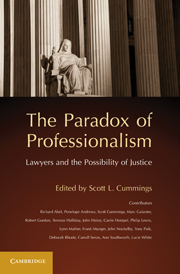Book contents
- Frontmatter
- Contents
- List of Tables and Figures
- Contributors
- Preface and Acknowledgments
- 1 Introduction
- PART I LAWYERS AND THE PUBLIC GOOD: THE FUNDAMENTAL DILEMMA
- PART II LAWYERS AND THEIR CLIENTS: DETERMINANTS OF ETHICAL PRACTICE
- 6 How and Why Do Lawyers Misbehave?
- 7 Aspects of Professionalism
- 8 Professional Regulation and Public Service
- 9 An Innovative Approach to Legal Education
- PART III LAWYERS AND SOCIAL CHANGE: MOBILIZING LAW FOR JUSTICE
- 14 Epilogue
- Index
- References
6 - How and Why Do Lawyers Misbehave?
Lawyers, Discipline, and Collegial Control
Published online by Cambridge University Press: 05 June 2012
- Frontmatter
- Contents
- List of Tables and Figures
- Contributors
- Preface and Acknowledgments
- 1 Introduction
- PART I LAWYERS AND THE PUBLIC GOOD: THE FUNDAMENTAL DILEMMA
- PART II LAWYERS AND THEIR CLIENTS: DETERMINANTS OF ETHICAL PRACTICE
- 6 How and Why Do Lawyers Misbehave?
- 7 Aspects of Professionalism
- 8 Professional Regulation and Public Service
- 9 An Innovative Approach to Legal Education
- PART III LAWYERS AND SOCIAL CHANGE: MOBILIZING LAW FOR JUSTICE
- 14 Epilogue
- Index
- References
Summary
A fundamental principle of professional labor is that the members of a specialized occupation, as professionals, enjoy autonomy. In sociologist Elliot Freidson's words, professionals “control their own work.” The practitioners themselves decide what constitutes acceptable or appropriate behavior. Professions establish rules and systems of self-regulation to teach and enforce the expected standards of conduct on their members. One way, then, to assess legal professionalism is to ask how well lawyers regulate themselves. The extensive literature on lawyer regulation paints a negative picture.
The Watergate scandal of the early 1970s brought renewed scrutiny to the legal profession. Although a variety of changes have occurred since then to improve lawyer regulation, numerous problems remain. Law schools now require students to take legal ethics, but such courses generally lack stature and respect. Bar discipline was reorganized in the 1970s to transfer some control from bar associations to agencies of state supreme courts. State discipline agencies in turn have increased their investigation of grievances filed against lawyers. But the vast majority of grievances continue to be dismissed. Much professional discipline is private (such as a warning letter, reprimand, or confidential diversion program), which undermines public trust and confidence in the system. Further, even the most common forms of public sanctions on lawyers (public censure, suspension, or disbarment) are specific to that state, and nothing prevents a sanctioned attorney from seeking bar admission in another state (although they would be required to disclose any prior sanctions).
- Type
- Chapter
- Information
- The Paradox of ProfessionalismLawyers and the Possibility of Justice, pp. 109 - 131Publisher: Cambridge University PressPrint publication year: 2011
References
- 2
- Cited by

